https://philaholisticclinic.com/natural-treatment-for-eye-allergies/
Treatment for eye allergies is important cause our eyes are very fragile and all eye diseases eventually lead to vision loss. The goal of the treatment for eye allergies is first of all to deliver relief of eyes itch and eyes burning. Itchy eyes force individuals to mechanically touch them in order to relieve the itch and very often an individual is losing control and touches itchy eyes too hard causing injuries and bruises of the cornea. Eyes burning allergies lead to redness of the eyes and a person that suffers from eyes burning allergies is unable to keep his eyes open and continue work or other forms of daily routine. The best eye allergy treatment is to avoid the allergen that’s causing it. However, this isn’t always possible, especially if you have seasonal allergies. Luckily, there is numerous eye allergy treatment that can relieve the symptoms of the allergies.
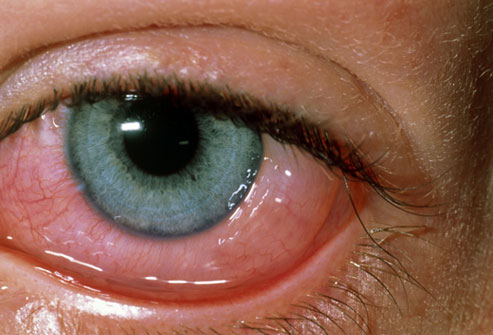
Medications
Medication is one of the eye allergy treatment. Certain oral and nasal medications can help alleviate eye allergies, especially when other allergy symptoms are present. These medications include:
- Antihistamines, such as loratadine (Claritin) or diphenhydramine (Benadryl): It helps to relieve watery and itchy eyes, it is also one of the best allergy medicine for itchy eyes. Although it may cause drowsiness after use.
- Decongestants, such as pseudoephedrine (Sudafed) or oxymetazoline (Afrin)
- Steroids, such as prednisone (Deltasone), this is one of the best allergy medicine for itchy eyes.
Allergy shots
Allergy shots may be recommended if symptoms don’t improve with medication. Allergy shots come in form of immunotherapy that involves a series of injections of the allergen. The amount of allergen in the shot steadily increases over time. The allergy shots modify your body’s response to the allergen, which helps reduce the severity of your allergic reactions.
Eye drops
Many different types of prescription and OTC eye drops are available for eye allergy treatment. Eye drops frequently used for eye allergies contain olopatadine hydrochloride, an ingredient that can effectively relieve symptoms associated with an allergic reaction. Such eye drops are available under the brand names Pataday and Paseo. Eye drops may cause burning or sting at first. Any unpleasantness usually resolves within a few minutes. Some eye drops may cause side effects, such as irritation.
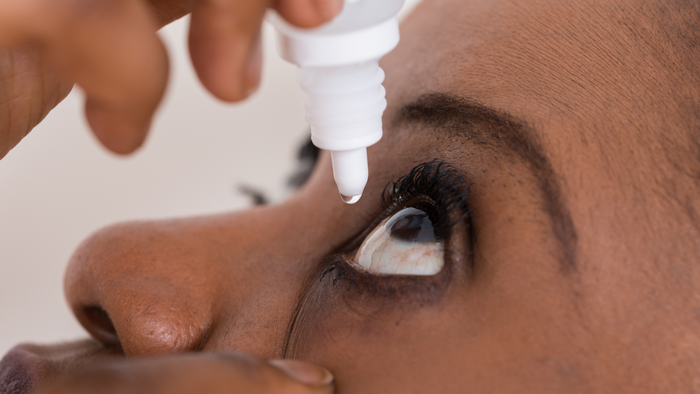
However, if you are against using medication due to their side effects, or just want to do as much as possible to relieve your allergies, there are several eye allergy natural treatments that can help. Eating foods containing quercetin, such as citrus fruits, onions, garlic, berries, parsley, and broccoli, can help stabilize mast cells and reduce eye allergy symptoms. If you have difficulty breathing, you can put a few drops of eucalyptus oil in a diffuser to relieve your constipation. Lastly, to avoid eye allergy: wear sunglasses and a wide-brimmed hat when outside, change clothes quickly, and shower when you come in for the day.
Eye allergy – causes, symptoms, and pathology
Eye allergy medically known as ocular allergy affects the thin tissue (known as the conjunctiva) that covers the white part of the eye as well as the insides of the eyelids. This tissue acts as a barrier to protect the eyes from invading particles, microbes, and other debris. Another player in eye allergies is the tear gland. Tears aren’t simply made up of water – they contain important immune defense substances, like immunoglobulin (antibodies), lymphocytes (specialized white blood cells), and enzymes. When airborne allergens collide with your eyes, an allergic reaction is kicked off in the conjunctiva which causes itching and burning, red color, and swelling.
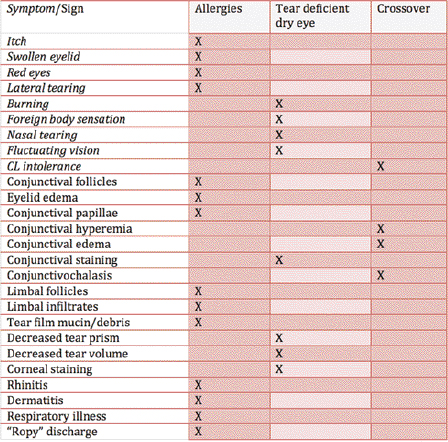
Once the eye is irritated by contact with pollen or pet dander or some other allergy trigger, the tear glands do their best to flush the offensive allergen from the eyes. This attempt to flush irritants out of the eye is what causes the eyes to flood with tears. The irony of eye allergies is that your body is trying to protect you, but accidentally it is making you feel miserable in the process.
Watery eyes
Tears are normally discharged through your tear ducts and then evaporate. When you produce too many tears, they overwhelm your tear ducts, and you develop watery eyes. Most of the time, watery eyes resolve without treatment, but the condition can sometimes become a chronic problem.
It is common to temporarily produce excess tears when you are emotional, laughing, coughing, vomiting, experiencing strong taste sensations, or yawning.
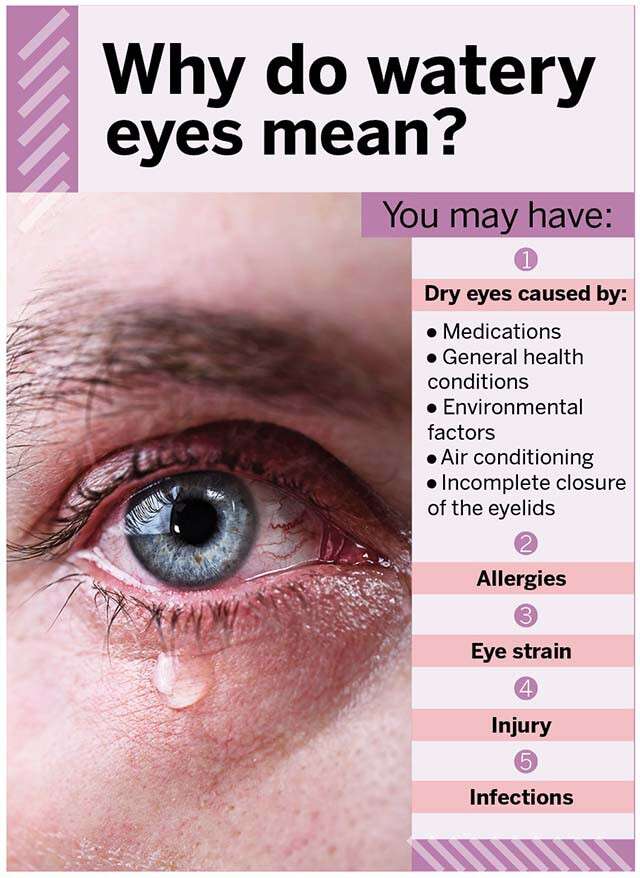
One of the most prevalent reasons for watery eyes is dry eye syndrome. Extremely dry eyes can cause you to produce excess tears. Because your eyes are not receiving proper lubrication, you continually produce an abundance of tears, which continues the cycle.
If your tears do not contain the right balance of water, salt, and oils, your eyes can become too dry. The resulting irritation causes an overproduction of tears that spill out through your tear ducts.
Other common causes of watery eyes are:
- Weather conditions such as dusty weather, wind, cold, and sunshine
- Eyestrain
- Environmental factors such as bright light and smog
- Common cold, sinus problems, and allergies
- Inflammation of the eyelid (blepharitis)
Puffy eyes
Puffy eyes occur for many reasons, including inherited facial features, aging, stress, eye strain, and individual skin features such as texture. Although the terms are sometimes used interchangeably, puffy eyes are different from swollen eyelids caused by allergies, infection, inflammation, or trauma.
Causes for puffy eyes
The symptom of puffy eyes happens when an abundant amount of fluid accumulates under your face skin, especially around the eyes. It’s not always clear what are the causes for puffy eyes, but most likely it happens because of the allergy to an extensive variety of pollens, chemicals, latex, insect bites, milk, vegetables and fruits, water, and sunlight.
What causes puffy eyelids
- Allergies
This is one of the causes of puffy eyes, it is also the simplest to treat. These can be due to hay fever or a reaction to foods, chemicals, or other irritants.
- Conjunctivitis
Also known as pink eye, this infection is common during cold and flu season. It’s often caused by a virus, bacteria, allergens, or other irritants.
- Chalazion
Similar to a stye, a chalazion is a harmless, small bump that appears on your eyelid.
To the question of what causes puffy eyelids the answer is the same – allergic reaction.
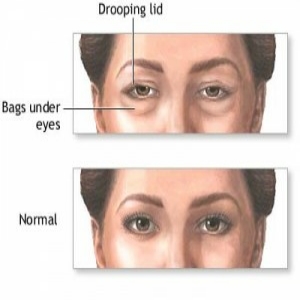
Note: Eye allergies are the same as any other type of allergy. The tissues that make up the allergy-sensitive areas of the eyes are very similar to the tissues in your nose and throat. Eye allergies often co-exist with other allergic conditions like hay fever (nasal allergies) and even eczema (skin allergies). The biggest difference between eye allergies and any other type of allergy is the way that the allergen comes in contact with the body.
Different methods allergens find their way into the eyes:
- Airborne allergens can enter the eyes by simply walking into an area where the source of the allergen is located
- Another common way for allergens to enter your eyes is by simply rubbing or touching the area around your eyes with your hands. Sometimes rubbing your eyes after they start burning just helps to spread more allergens to the area.
- Nasal allergies are always triggered by inhaling airborne allergens like pollen or animal dander. People with allergic eyes often have a strong family or personal history of allergies and most likely are going to experience eye allergy symptoms before the age of 30.
Eye allergy treatment using natural remedies
Several eye allergy natural treatments have been used to treat eye allergies with varying degrees of success. Listed below are different forms of natural treatment for eye allergies:
Home remedies for eye allergy – most common Treatment for Eye Allergies
Home remedies for eye allergies are a natural treatment for eye allergies that is effective without side effects. Listed below are effective home remedies for eye allergy
Cucumber Slices
- Cucumber contains antioxidants. The cooling effect of cucumber may help ease the symptoms of eye allergy.
Water
- Water is a natural eye allergy treatment that helps cleanses the eyes and may soothe the irritation instantly.
Witch Hazel
- Witch hazel possesses natural anti-inflammatory and astringent properties. Hence, it may help in alleviating the symptoms of eye allergy.
Homeopathic remedies for eye allergy – #1 Treatment for Eye Allergies
The sudden appearance of symptoms including itchy, watery, and red eyes when eyes come in contact with an allergen is known as an eye allergy.
Homeopathic medicine for eye allergy offers excellent help. Based on a homeopathic fundamental philosophy “like cures like” homeopathic medicine has an answer for eye allergy in a form of homeopathic pills and homeopathic eye drops.
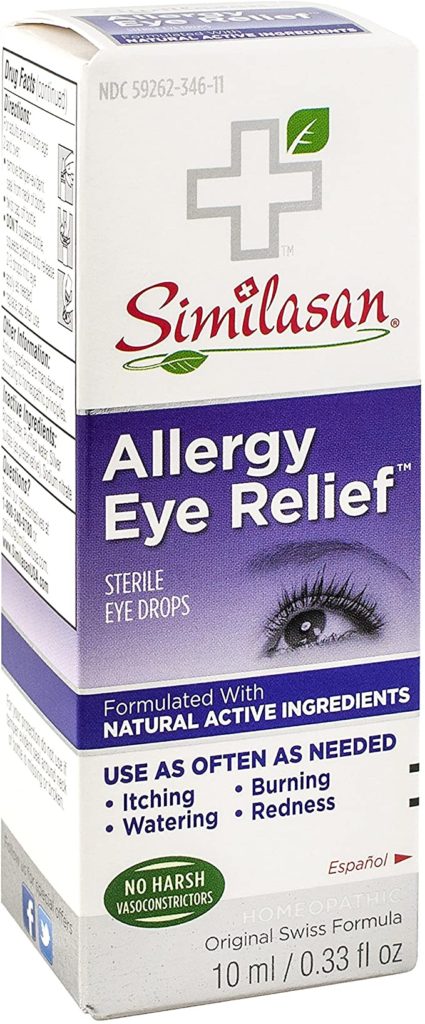
Initially, it helps in treating acute symptoms of eye allergies. Following this, it aims to address the chronic tendency of eye allergies. The medicines used in the homeopathic system for managing eye allergies are of natural origin and treat allergies without any side effects. Listed below are homeopathic medicine for eye allergy:
Apis Mellifica:
- This homeopathic medicine for eye allergy is ideal for eye allergies characterized by burning and stinging in the eyes. Edema accumulates around the eyes; the eyelids swell and swell. A watery discharge comes from the eyes.
Euphrasia:
- Both pills and homeopathic eye drops made from Euphrasia is ideal medicine for treating eye allergies with sharp discharge from the eyes. The discharge is acidic and burns the skin it comes in contact with, and there is a burning pain in the eyes. The eyes remain watery.
Argentum Nitricum:
- It is an ideal homeopathic medicine for eye allergies with bulky discharge. The patient develops photophobia and flashes like eye pain. The conjunctiva swells and the discharge is copious.
Ruta:
- This is one of the eye allergy natural treatments for treating eye allergies when a foreign object is felt in the eyes. With severe eye irritation, the patient feels like a dust particle in the eyes. The eyes turn red and quite sore.
Pulsatilla
- This is an ideal homeopathic medicine for eye allergy when the use of cold water is facilitated. Symptoms include discharge of thick, yellow liquid from the eyes with itching and burning sensation. The eyelids appear to be clumped together.
Acupuncture for eye allergy – old oriental treatment for eye allergies
Acupuncture, the most well-known traditional Chinese medical procedure, is the practice of inserting thin needles into the body at specific points to relieve pain or treat a disease. Acupuncture triggers spontaneous healing reactions in the body, and scientific studies have proven its efficacy for treating inflammation, pain, depression, and a host of other disorders. Acupuncture believes that the development of allergic conjunctivitis is mainly determined by a constitutional factor, external or environmental factors are merely triggers. Since it is hard for individuals to avoid external triggers completely, eye allergies are likely to be constant trouble for them.
Acupuncture for allergies is used to balance and remove blockages in the body’s energy (qi). It also strengthens the Lung and Liver Qi and in particular, the Defensive Qi (Wei Qi) to block the “invasion of wind” (in our western thinking, blocking the noxious air-borne pollens, bacteria, and virus pathogens).
Acupuncture for allergies can help prevent the occurrence of infection, relieve symptoms, correct immune system imbalances, and allow healing of sinus tissues. Many of the western treatments for allergies have been derived from isolated compounds of single herbs. However, the best medicine is not achieved in using the same herb to treat all cases, but in using the right combination of herbs, acupuncture, and nutritional support for each patient. It is necessary to treat both the root and the manifestation to produce lasting results.
Treatment for watery eyes
There are different treatments for watery eyes, it all depends on the underlying cause of your watery eyes. Listed below are the treatment for watery eyes
Medications:
One of the treatments for watery eyes is medications. Medications like antibiotics, if an infection or eye injury causes watery eyes. If you have a condition like dry eye syndrome, your doctor prescribes artificial tears or prescription eye drops.
Saline solution
If a blocked tear duct causes watery eyes, your doctor uses a saline solution to gently open the blocked duct. In some cases, doctors use a long, thin instrument called a probe to open tear ducts manually. If you have extensive blockages, your doctor may recommend surgery to open your tear ducts.
Eyelid repair:
If the eyelids are sagging (entropion or extropian) the doctor will likely recommend repair of the eyelids.
Natural remedies for watery eyes
Tears are essential for healthy eyes as they help lubricate and clean them. However, excessive tearing of the eye can temporarily blur your vision. This condition, known as epiphora is a common ophthalmological complaint. Natural remedies for watery eyes are natural and easy to get without any side effects, listed below are natural remedies for watery eyes
Use sanitized eye wipes
The use of sanitized eye wipes is one of the natural remedies for watery eyes because watery eyes can often be a result of dirt accumulation at the corner of the eye. You can gently wipe off the gunk with a sanitized eye wipe, or a cotton ball dipped in sanitized water.
This is especially useful for wiping off any gooey material developing near a baby’s eye until their tear ducts develop.
Apply a cold compress
The application of a cold compress is a popular anecdotal remedy for watery eyes. You can dip a clean washcloth in cold water and place it on your eyes, applying gentle pressure.
Apply a warm compress
If your eyes have turned extremely watery due to a blockage in the tear duct, placing a warm compress on the affected eye may help relieve some of the discomforts.
The mild heat may help relieve the congestion in the tear duct and facilitate the drainage of the excess tears.
Treatment for puffy eyes
Some home remedies like soothing cucumber slices – or even hemorrhoid creams like Preparation H – can be used as a treatment for puffy eyes from allergies, a longer-lasting solution will depend on the underlying cause. Listed below is a treatment for puffy eyes from allergies
- The use of eye drops to relieve any irritation is one of the treatments for puffy eyes from allergies
- Applying iced compresses if your eyelids look puffy due to allergy
- Applying cucumber slices or chilled tea bags over closed eyes
- Splashing cold water over your face and eyes is one of the treatments for puffy eyes from allergies
Conclusion on Treatment for Eye Allergies
Eye allergies are a common condition it requires aggressive and effective treatment to prevent loss of vision. Allopathic eye allergy treatment includes the use of antihistamines and steroids in the form of pills or eye drops.
Natural treatment for eye allergies is as effective as allopathic. Natural remedies for eye allergies are safe and cause no side effects.
It is very important that you consult a medical doctor trained in naturopathy before starting natural treatment for eye allergies. Only medical doctors using high-tech equipment can check the general condition of the affected eyes and advice which natural remedies are safe and appropriated.
Contact Philadelphia Holistic Clinic to schedule your appointment for evaluation and treatment provided by Dr. Tsan and associates
Comments
Post a Comment